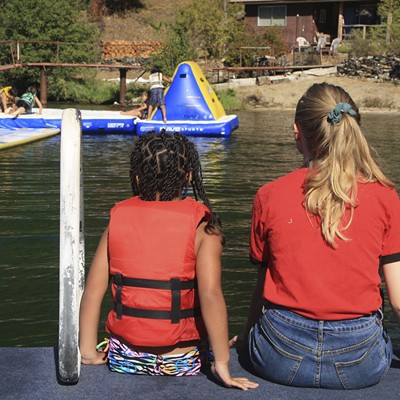Most people think doctors have it all — great careers, busy offices, money for vacations and cars. But here’s a surprising fact: After 10 years in practice, 17 percent of general internists will have left their field, according to findings from the American Board of Physicians and the American Board of Internal Medicine.
Considering all the years those doctors spent in school — often racking up huge debts along the way — the fact they are choosing to abandon their careers after just a decade says something about the challenges of practicing medicine these days.
Off the record, doctors will give you long lists of the professional aches and pains they live with. Few doctors were willing to detail all their frustrations openly. But we did find five Spokane physicians who were willing to discuss some of the things about a doctor’s life that are troubling.
We also asked John-Henry Pfifferling, Ph.D., to comment on those challenges and suggest some ways doctors can cope. Pfifferling is an applied medical anthropologist interventionist. His Center for Professional Well-Being in North Carolina provides consulting services for medical offices and hospitals — you could say he’s a doctor for doctors.
In spite of the fact that doctors’ skills are the result of tremendous personal and social investment, Pfifferling says there is a resistance to providing them the tools to ultimately deal with the challenges of their careers. He hopes that changes. “These are human beings under stress. I want them to have the best skills to handle it.”
Life on Call
For five days a week, Spokane neurosurgeon Dean Martz works 12 hours. On the sixth day, he works a 24-hour shift. Like many doctors, for one day a week Martz has to live the life on-call — an entire day leashed to a cell phone or pager, where 4 am phone calls interrupt a good night’s sleep, lived within a 20-minute drive from the operating room.
He may get called with a simple question. Or he may be asked to drive to the hospital to operate on a patient who has been in an accident. In the meantime, he can’t do anything that would restrict his ability to make it to the hospital quickly.
Martz has been a doctor for decades. The 12-hour shifts aren’t a problem. It’s that long night of waiting.
“The call is really the part of this profession that over time is the most wearying,” Martz says. “Every activity of life has been interrupted by a call.”
In his medical group, there are only five neurologists. The fewer the number of specialists, the more often a surgeon has to take an on-call shift. Some specialists may have two or three days a week on-call.
The key, Martz says, is to find an effective physician group, ideally with enough similar specialists to lessen on-call days. Being on-call too often can lead to losing sleep, and that can be dangerous.
One large study of medical residents found that, after five 24-hour shifts a month, residents were 7.5 times more likely to make a significant medical error.
“Physicians who take frequent ER calls often function in a state of chronic partial sleep deprivation,” writes Lawrence Huntoon, editor-in-chief of the Journal of American Physicians and Surgeons. “Limiting on-call hours and taking a daily siesta may benefit both physicians and patients.”
During the regular week Martz meets with conventional patients. It’s predictable. But when he’s on-call, he sometimes dreads the situation waiting in the operating room. The ER stories are often grisly and tragic.
“You periodically have a chance to really do something that will save somebody’s life when you’re on-call,” Martz says. “You’re also on some things that are irreversible and really sad. All of that is very hard on your family.”
In the winter, they go skiing without him. In the summer, he stays home while the rest of the family goes to the lake. But even when he’s not at work, it can be hard to leave it all behind.
“It’s like anything else. When you come home at the end of the day, you have to be home. You have to be focused on the people who are there and not have your brain somewhere else,” Martz says. “I don’t always succeed in that.”
Dr. Pfifferling Says
“The beauty and nobility of call is that sickness and urgency and disasters don’t occur 9-5,”says Pfifferling. “There’s an opportunity to make a tremendous difference.”
But the beauty and nobility can quickly become obscured by what he calls the “onerousness of call.”
Part of the problem is the basic nature of emergency care. “They’re all associated with crisis management instead of prevention,” he says. Instead of managing calls on a crisis-by-crisis basis, he recommends taking time to step back and assess ways to manage some of the bothersome elements.
“Make sure you are smart enough to predict the kinds of things that will drive you up the wall,” he says. Then look for solutions. For example, a common problem is doctors being called when they really aren’t needed — perhaps it’s the wrong specialty, or a case the surgeons would rather have the ER doctors manage. Whatever the reason, being awakened at 3 am is no picnic.
“What we’ve done with orthopedic groups is to have them arrange educational meetings with the ER docs,” says Pfifferling, to teach them more about which doctors specialize in which conditions and when it is appropriate to call them. Another option he recommends is having surgical physician assistants screen cases for doctors to make sure they’re appropriate before calling doctors.
And for physicians, he offers a little tip: “When the phone or pager goes off, don’t answer on the first ring. Biologically, you are in the worst possible mode to speak civilly. Give yourself a moment to get yourself together … so for that three-tenths of a second, you at least respected yourself.”





















